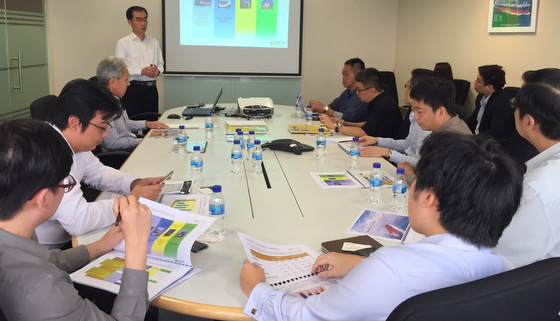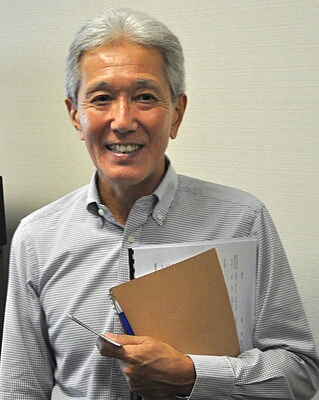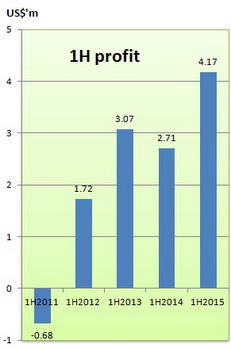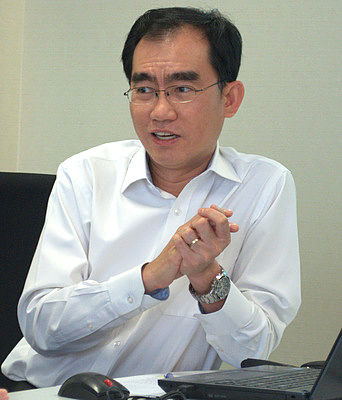 2Q results briefing @ Uni-Asia's office in AXA Tower in Shenton Way. Photo by Reyna Mei.
2Q results briefing @ Uni-Asia's office in AXA Tower in Shenton Way. Photo by Reyna Mei.
UNI-ASIA HOLDINGS' 1H2015 net profit of US$4.17 m was the strongest first-half profit for the group in five years (chart below).
It was aided by investment returns -- Uni-Asia disposed of an investment property, realising a US$1.9 m gain. And there was a fair value gain of US$1.4 m from another investment.
Net earnings attributable to shareholders for 2Q came in at US$3.79 m (+153% y-o-y). For 1H, it was US$4.0 million (+47% y-o-y). Chairman and CEO Michio Tanamoto.
Chairman and CEO Michio Tanamoto.
Photo by Leong Chan Teik
 CFO Lim Kai Ching. Photo by Leong Chan Teik
CFO Lim Kai Ching. Photo by Leong Chan Teik
Meanwhile, Uni-Asia's ship charter income, which is recurring and a key source of profitability, grew steadily.
Charter income rose 54% y-o-y to US$13.9 m, thanks to four vessels delivered to the group from 2H2014 onward till end-June 2015.
Asked for his views on the ship market, Mr Michio Tanamoto, the Chairman of Uni-Asia Holdings said: "Recently, the index for dry bulk carriers was at the lowest in 30 years -- but has since recovered to some extent. Charter hire is low and ship values are low too.
"This is mainly due to a substantial decrease in imports of iron ore and coal by China. The projection for the future is not bright because the Chinese economy is uncertain.
"But one thing is, the supply of bulk carriers has been reducing, mainly because of scrappings of old vessels. In the future, we expect demand and supply would be adjusted, causing charter hire vessel prices would increase.
| Net profit (US$'000) in 1H2015 | |
| Non-consolidated Uni-Asia (Investment & Asset Management of Vessels & Properties in China/HK) |
(522) |
| Uni-Asia Shipping Ltd Ship Owning & Chartering |
1,428 |
|
Uni-Asia Capital (Japan) Ltd |
3,362 |
| Uni-Asia Hotels Ltd Hotel Operation in Japan |
136 |
| Group total | 4,169 (+ 54%) |
"There are 4 kinds of bulk carriers according to size --- we focus on small handy vessels. Out of our 15 bulk carriers, 13 are small handy and 2 are supramax. Their demand and supply has been the most stable type of vessel. That's why we have invested in small handy vessels.
"There are about 4,000 small handy bulk carriers in the market. Over 30% of them are aged over 20 years and many will be scrapped in a few years. That will have a positive impact on demand for small handy bulk carriers, and we are optimistic of the future of handysize vessels."
And, Mr Tanamoto added, the percentage of newbuildings of small handysize vessels against the existing fleet is the lowest among all vessel types, as shipbuilders tend to focus on larger vessels.
It's not just handysize vessels: The group bought two containerships from a shipping fund (called Akebono) that it manages. The containerships were transacted as they had completed their 8-year charters. After buying them, Uni-Asia has chartered them out.
The first one, chartered out in April 2015, contributed about US$850,000 in revenue (as can be deduced by the charter income reported in the Non-Consolidated Uni-Asia segment) in 2Q. The other containership, which was chartered out at end-June, will contribute to the P&L from this 3Q onward.
| Other business areas: * HK property: Uni-Asia is part of a JV to redevelop a commercial office building in HK, which is expected to be completed in 2017. Construction started last year. Uni-Asia's investment amounts to HKD80.0 million. (This is Uni-Asia's second investment in HK property, the first project having been completed in 2013. In that case, the group invested US$2.2 m and obtained US$8.3 m including cost, gains and fees).
(Uni-Asia has completed and sold 9 such projects in the past). * Japan hotels: Uni-Asia's hotel operations had a US$136K net profit in 1H2015, and is expected to continue to be profitable for the full year. Looking undervalued: The shares of Uni-Asia recently traded at S$1.345, or just 0.33 of the net asset value of US$2.99 per share. |
Powerpoint materials for the results briefing can be found here.






